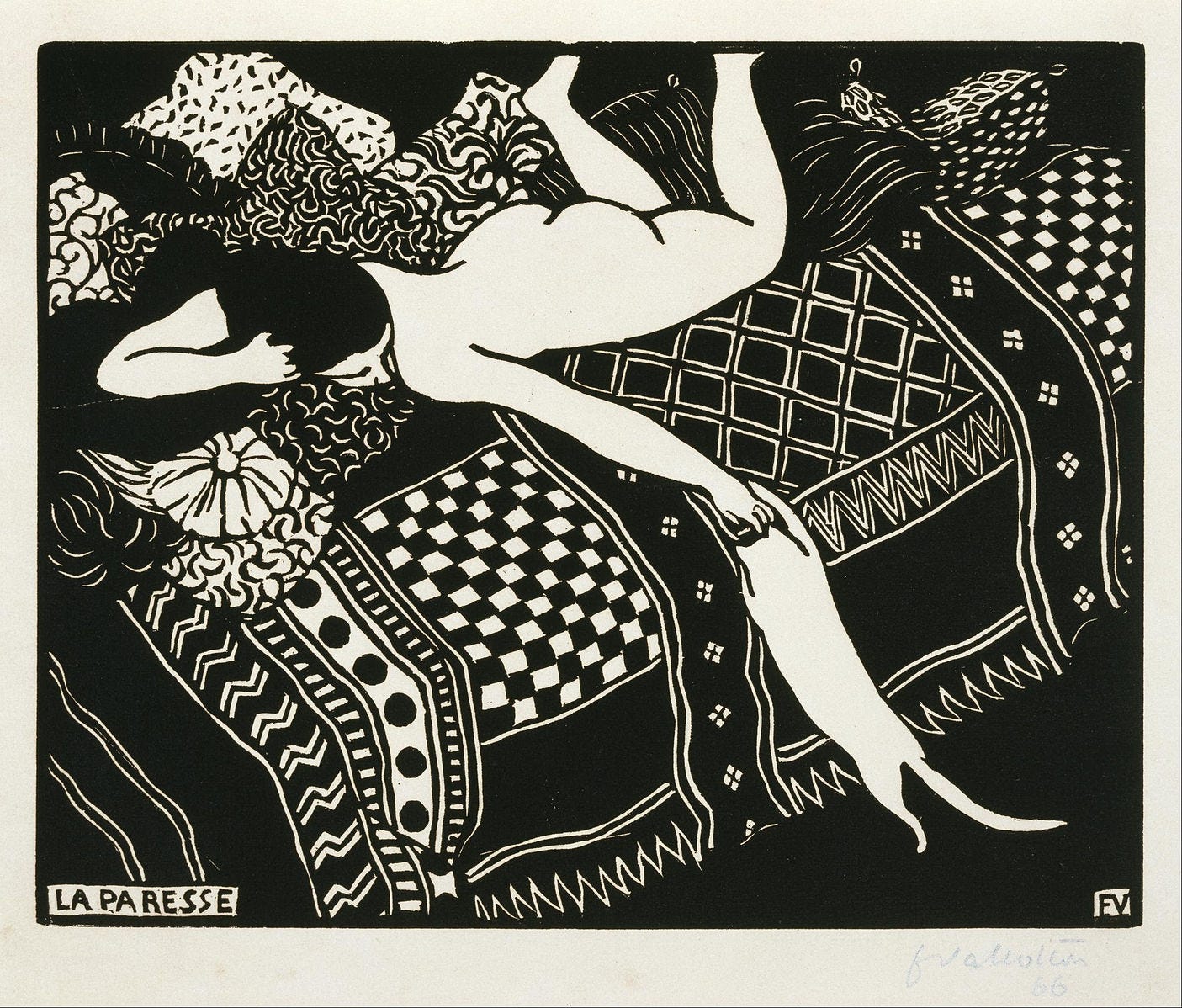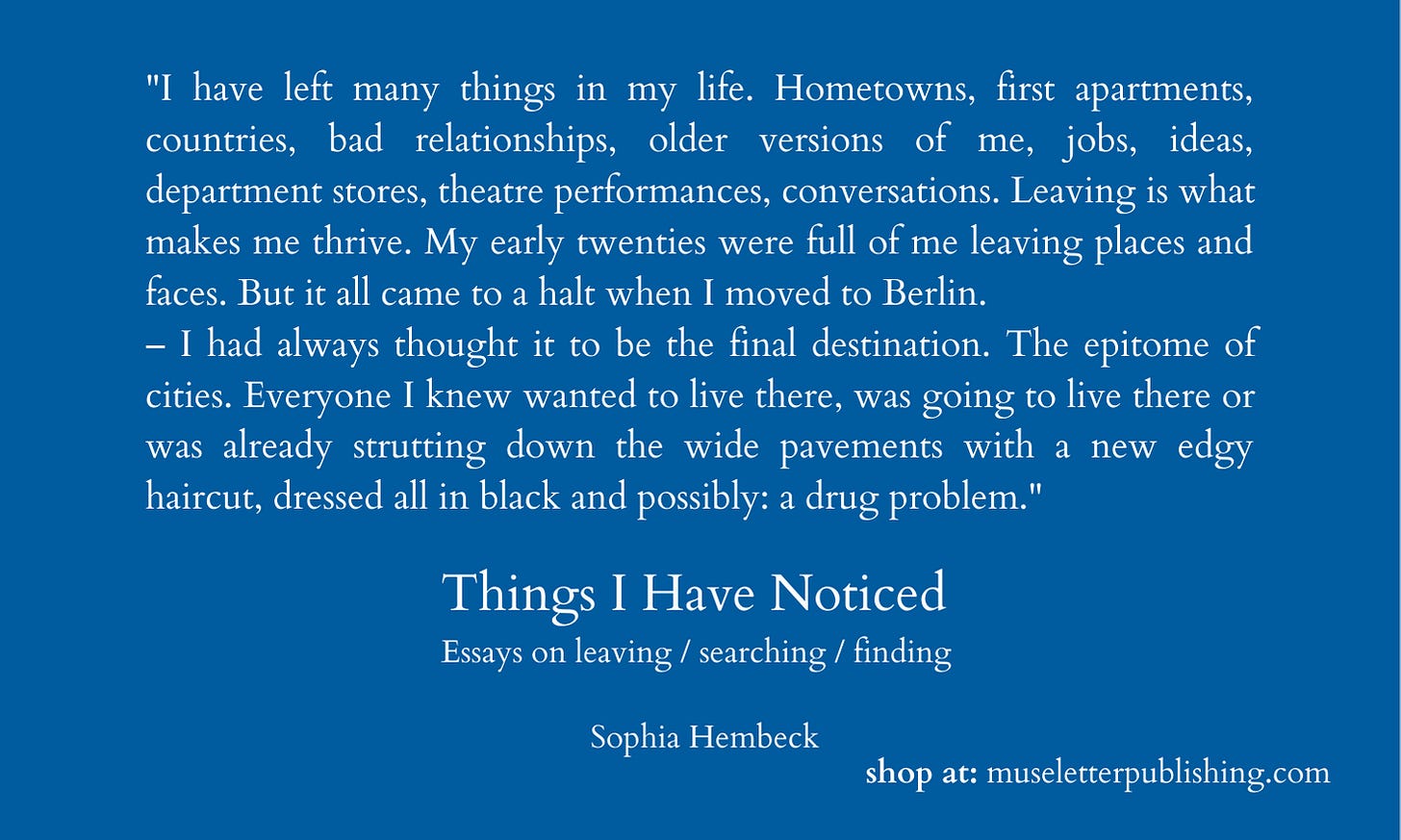The Muse Letter is a Sunday newsletter. If you love it, consider supporting it financially. For £2 per week you’ll gain access to the weekly extra content, Q&A, creative advice, recommendations in the Muse Salon. Thank you!
Lately people have been giving a lot of advice. From close and far, finding their way in your inbox, in your DMs, in your whatsapp messages. Demanding to: listen to them, if you only do this and never do that, if you work on yourself, on you: the only thing you’re actually able to change!
“This is the danger of shipping your words to strangers at a rapid clip. You find it echoing everywhere these days: all words sound instructional, aspirational, every writer slowly taking the shape of a scold, a guru, a fish wife, a pocket knife. Each instruction manual is made of earnest words, so certain, so absolutely sure, insisting that you to take the most appropriate shape: Do this.” writes Heather Havraleski in her newsletter “Ask Molly” in January, that I’m only catching up on now at the end of February, putting a nice little flag on it, marking it as read in my overflowing email folder named: to read.
– So call me fish wife.
In the last Muse Letter I interviewed Charlotte A. Moore and we talked about The Artist Way. (You can find the interview here.) An integral part of that 12-week creative program is to write 3 pages in the morning, every morning. They are called: the Morning Pages.
Julia Cameron the author of The Artist Way is very loose when it comes to doing all the exercises in her book but she insists on two things: The artist date and the Morning Pages. She says: “The bedrock tool of a creative recovery is a daily practice called Morning Pages. Morning Pages are three pages of longhand, stream of consciousness writing, done first thing in the morning. *There is no wrong way to do Morning Pages*–
they are not high art. They are not even “writing.” They are about
anything and everything that crosses your mind– and they are for your eyes
only. Morning Pages provoke, clarify, comfort, cajole, prioritize and
synchronize the day at hand. Do not over-think Morning Pages: just put
three pages of anything on the page...and then do three more pages tomorrow.“
So two years ago when I embarked on my journey on the Artist Way; I believed her. I woke up every morning and poured my miserable thoughts onto the page. Some days were better than others but all days were up to a horrible start because and here comes why I don’t write Morning Pages in a strict sense anymore: My mind is just not it’s brightest when I wake up. In fact if I would leave it and observe it put it under the magnifying glass of putting thoughts on paper right upon waking, it turns out it’s: obsessive, sad and often angry about something and perpetuating those patterns so that after an hour I don’t feel relieved of having it all out of my mind the opposite occurs: I am now fully aware that everything in my life sucks, I suck and continue to ruminate over it for the rest of the day. On repeat.
Interestingly I did not stop. It’s hard to stop when so many people swear on something. And I loved all the other exercises. I truly recommend trying The Artist Way. To answer the questions in the weekly check-in sessions, doing the artist date and the general principal of “art is for everyone”. I did see progress and felt inspired there. So joining in the choir of proclaiming how “Morning Pages are so great. You just need to stick with it.” I annoyingly said that to people, trying to convince them and in doing so myself. Because don’t you want to believe it? That you do something every day and it turns out to be this deep well that you can retrieve great creative energy from? - Of course you do. Magic formulas work like that. So I was a good student and reminded myself that as Cameron says: “Morning Pages are often angry, whiny, petty stuff” So I continued. I complained, I felt worse but somehow there was still hope that after a while it would turn around. I would make it to the other side. – Till I didn’t.
It happened like most things happen quite ordinarily I ran out of notebooks. After almost one year of spending my mornings writing three pages the stack of notebooks I had purchased in the Summer was gone, working hours in the Café were plenty, it was December pre-christmas and I just couldn’t be bothered. The next morning I woke up later than usual, I put on music, made pancakes, scrolled through articles, petted my dog and didn’t miss it. A week later it felt like I finally had woken up from a bad dream. I felt like I wanted to write again: not my sad morning thoughts, but actually work on the theater play that I had neglected for the past months. Actually thinking and creating not just dumping my unchecked thoughts. The very thing that Morning Pages were supposed to nourish – my inner artist – was finally set free from the daily monotony. Writing was fun again and beautiful and the way I needed it: playful and on my terms.
In an article called “What’s All About This Journling?” by Hayley Phelan from 2018 in the New York Times I find a lighter approach. Phelan writes about her own process of using the Morning Pages while also including other perspectives and mentions Dr. James W. Pennebaker and his book Opening up: The healing power of expressing emotions .
She writes: “Dr. Pennebaker’s research has found that even a one-time 15-to-30-minute session of focused journal writing can be beneficial. In fact, he said he is not ‘a big fan of journaling every day.‘
‘One of the interesting problems of writing too much, especially if you’re going through a difficult time, is that writing becomes more like rumination and that’s the last thing in the world you need,‘ he said. ‘My recommendation is to think of expressive writing as a life course correction. As opposed to something you have commit to doing every day for the rest of your life.‘
If you’re distressed about something, Dr. Pennebaker advises, set aside three to four days to write for 15 to 20 minutes a day about it. If you don’t find a benefit from it, he says, ‘stop doing it. Go jogging. See a therapist. Go to a bar. Go to church‘“
The literal meaning of dogma in ancient Greek is "something that seems true." Not is. A quite important notion. I do believe that Cameron thinks and probably has lots of proof as to why the Morning Pages work but the dogma she creates around it feels too strong for me. There are times where waking up half an hour early is just the worst I could do to my mental health. There are people like me who need to immediately busy themselves with mundane tasks like having breakfast, planning their day, reading news, taking a shower to pass that first hour of morning so their mind can ease into the day and doesn’t start immediately obsessing over something bad.
Rebecca Warner a fellow writer has made similar experiences as she writes on Medium: “You see, for anyone who is a naturally pessimist and chronic over-thinker, morning pages are letting go of the wheel and watching as you dive head-first off a cliff. I would begin to veer into dangerous territory where I would question my competence, catastrophise and get surprisingly nasty about the people around me. My ‘shadow side’ completely takes over. Cameron urges you to just let go; to write down whatever you’re feeling without scrutinizing it further. This actually promotes dangerous consequences for those of us who have intrusive thoughts.
Don’t get me wrong, we all need to confront it every now and then — but first thing in the morning isn’t the ideal time for existential crises. I would come away from my journaling feeling panicked and defeated, the exact opposite of what its supposed to do for you.”
So breaking free from that habit actually helped me create a morning routine that supports me, which is in many ways no routine at all. Some mornings I wake up and dream some more, other morning’s I scroll my phone or start working right away. I customize it to how I’m feeling that day. And sometimes when I’m done with all that later in the day I find myself writing notes on pages, when I’m stuck with something, I let my thoughts run. One could call them midday pages but let’s not be dogmatic about it.
ONE THING TO DO
I recently discovered the Black Sunflower Poetry Press :
“Black Sunflowers is an art-oriented, small poetry press with a focus on poetry from women, especially older women and black poets.”
They’re having an online poetry reading next Sunday, the 14th of March.
It’s free and you can register here.
SHOP
I recently wrote a book of essays called “Things I Have Noticed”. Some people said it’s the first book in a long time, they actually were able to read (pandemic and all).
Liked today’s Muse Letter?
If you’re feeling generous you can buy me a coffee or share the Muse Letter with a friend.






This is so interesting - I also feel like I am completely different person once I've been awake for a few hours. Far less prone to taking my dreams as serious portents of doom... I like Dr Pennebaker's advice much more!